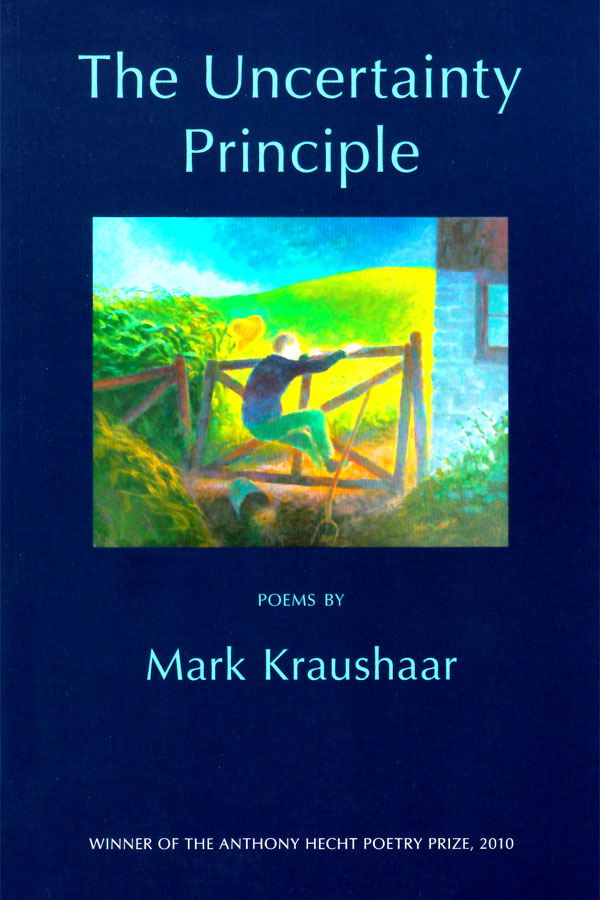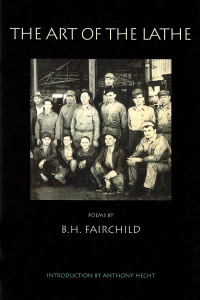The Uncertainty Principle
£8.99
Winner of the 6th Anthony Hecht Poetry Prize
Foreword by the judge, James FentonIn his splendid new collection, Mark Kraushaar addresses a tentative and awkward, sometimes funny though frequently heart-breaking struggle to find a path to meaning in the world, a task made more difficult still by the struggle itself. In “Cake” a man arriving too late for his own small birthday party, unable to cajole his exasperated and saddened wife and daughter into staying, watches them exit the diner in which the three have met, then finally opens a book. As the waitress approaches, the narrator asks, “And what in Hell is he reading?” Towards the end of “Chiropractor Claims to Travel Through Time” (a poem inspired by an AP story), the central character observes of his father, “He tried, I know, / but every evening / watching him watch the tv / I wondered what clues had eluded him. / Constricted, uncontent, incomplete, / what secret had he missed?”
The Uncertainty Principle
“Once a student told me her father said that when older people cry, they’re weeping because the world is beautiful – they already know it’s sad. Mark Kraushaar’s poems, too, look beyond the sorrow and find instead a world that’s almost unbearably lovely. I fell hard for Falling Brick Kills Local Man, Kraushaar’s first book; I have an even bigger crush on this one.” – David Kirby
“A bell goes tolling over the landscape of Mark Kraushaar’s The Uncertainty Principle and its burden is Moment, moment … The word keeps recurring in this engrossing collection. Kraushaar sometimes seems temperamentally as much short story writer as poet (something to be regretted only by those who would keep poetry pure of life’s muddy complexities), and many of his poems offer rich, beguiling, abbreviated narratives. The book abounds in character revelations perhaps too modest to be called epiphanies – but moments, even so, whose unlikely glimmerings are welcome and illuminating.” – Brad Leithauser
“Mark Kraushaar’s The Uncertainty Principle is the best counterargument to the specious claim that narrative poetry is either old fashioned, ‘linear’ or predictably ‘conventional’. These poems have all the excitement and complexity of life as we live it now, together with a depth of speculation that is positively stunning in the light it casts on the intimate nooks and crannies of social experience that all of us encounter but either fail to notice or find words for. The sensation of time is Kraushaar’s ultimate subject, but he approaches time so imaginatively, so freshly, through such a detailed range of voices and occasions, in poems that unfold in such surprising yet inevitable ways that one feels as if every other possible subject for a poem – love, death, the struggles of dailiness, the fear of loss, friendship and work, childhood, contingency, and lack of faith – has been woven into the netting of this one obsession. This is a book to be enjoyed and savored, to be read with pleasure and gratitude, to be learned by heart.” – Alan Shapiro
Reviews of The Uncertainty Principle
The Hopkins Review, Spring 2013
"A Kraushaar poem always works from the inside out and, in illuminating the most fundamental human experiences, becomes a meditation of hope on which the mind subsists after the words end. Like the artist in his poem "Non, je ne regret rien: Edith Piaf in Concert," he sings and sings again, for all he’s worth:
But you, sir, and you, mister,
think how the heart, atop its substrata
of explication and excuse, wants one more chance,
and you ticking softly away in the sad room
over the feed grain store, and you, and you,
the lady now standing,
the one just starting to clap, and you, mister,
and you, the one now bringing one hand
to your mouth – think of it, say it, sing it,
sing it again.
– Rosannah Oh
Antioch Review, Summer 2012
"If you’re paying any attention at all to the people you dodge on the street, sit next to in the left-turn lane until the light changes, hear swearing quietly somewhere or anywhere, then you’re ready to listen to what Mark Kraushaar has to offer, poems that aren’t excuses, aren’t explanations, just the sharply rendered facts of the matter. And on a rainy day at the gym, five guys who know way too much of the truth about each other and so about themselves see what there is to see in the ‘rattling’ plate glass: ‘rain on the awnings, rain over the windows, / rain over the gutters and rain / in soft, sparkling ropes along the curbs . . .’ (‘Third Street Muscle and Fitness’). And Henry, all the evasions of his abandoned marriage confessed, pretty much sums it up: ‘The Sox are strong this year, / we’re going places, I can feel it’ (‘There sat down, once, a thing on Henry’s heart so heavy’)."
Rain Taxi, Spring 2012
“Kraushaar’s narrative poetry has a fresh voice that is funny, challenging and profound. The secret to being happy, he says, is not to get twisted up by all that has been or what might happen, but to pay attention to the ‘gorgeous, and impenetrable present.’" – Mark Liebenow
Hayden’s Ferry Review, 14 November 2011
“Sweet Holy [ ______ ] (your choice of divine – but completely politically correct – descriptor here), Kraushaar’s poems rock. I’m going to drop some of the standard poetic analysis here, not because Kraushaar’s work doesn’t live up to it – it certainly does – but because it is so organic, has such spontaneity, such a gut-punch of recognition, that I feel freed to do so. While I’m in the grip of this strong sense of permission, I’m going to use it to use a few words that some poets might consider anathema when applied to their work: effortless, narrative, characterization, and fun." – Debrah Lechner
To read the whole of this review, please click on link: Full Review of The Uncertainty Principle
It’s rained all night,
and it’s rained all day, and by evening
when I get to the gym it’s started to thunder.
Still, here we are anyway, all of us, all the regulars,
George and Phil and Johnny B and Bob
and me and the big guy, the lifter from Janesville.
So first off George (who’s zipping his coat)
asks Phil who’s on the treadmill and the only
one raising a sweat will he run a mile
for every beer last night.
Which very funny, but Phil follows with, Hey,
I’m not drinking any more in ’08
(beat, beat) but I’m not
drinking any less either which, again,
very funny except we all know Phil has
problems with alcohol, but since he’s getting no laughs
he looks up and on the tv over the rowing machine
there’s the real life trial of a woman, blond
and twenty-three, a teacher who’s
had sex with an eighth grade boy.
Are you kidding, says George,
Are you kidding, says Phil, I’d clap her erasers,
and someone else, I’d polish her fruit,
and everybody’s nodding yes and yes again
until, at last, George who’s had problems with school
and problems with money and women and work
tells us he’d have majored in meredial reading
which is where the tv goes to an ad
and George waves once and steps into the weather.
So as the rainy wind flips his cheap rug straight
off his head like a flattened cat
it’s strange, nobody’s laughing, in fact, we’re quiet finally,
Phil with his crashed marriage and the daughter
on drugs, and even handsome Bob
and Johnny B, even the big guy
with those silly disproportionate arms,
and for a moment, for a discrete, small portion
of what I will one day refer to as the past,
there’s the five of us facing three
double-door sized panes
of rattling glass:
rain on the awnings, rain over the windows,
rain over the gutters and rain
in soft, sparkling ropes along the curbs,
and into the drains and under the ground.
The Waywiser Press
What The Dead Know
They know to keep quiet.
But they would tell you don’t worry.
They would tell you there’s
sloping gentle fields and a marvelous light.
They’d whisper, Mister,
take it easy, they would signal Madam, buy a hat.
They would tell you start again, rent a room, move
forward, breathe a little, read a little,
take a walk, watch your step.
They would tell you God
wears plaid pants, six-eyelet
oxfords, and a wrist watch, Helbros, gold.
They would tell you God’s
a girl in third grade knotting Her shoe.
They would tell you God’s a man with cracked glasses
mowing His yard, or He lives with Lilly,
His wife, and a son named Sal.
They would tell you He works in auto body repair
and plays the guitar.
They would tell you He’s thought up Himself,
that He thinks up botany and basketball,
eczema, mustard, and mayhem.
They would tell you He makes up the malls
and the back-alleys, the droplets, and the tiny specks
and spores, and the long, loud parties
that reach deep into the morning and mean
for someone a meeting, for someone
a mating and for someone a crashed
yellow Chevy and a trip to the joint.
They would say He makes up the frowsy freeways
and the dirty everyday, or that regarding a white cloud
in the shape of a thumbless glove, He thinks up breakfast
with bacon that sizzles and curls on itself like a lie though He
may never speak of this even to Himself.
What do the dead know?
They’ve signed on to keep quiet,
but if they could tell you they would,
and if they could they would comfort you.
They’d tell you, Go on and be happy, try it.
You would.
The Waywiser Press





